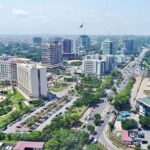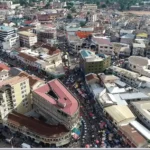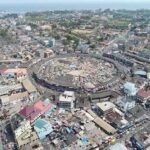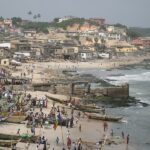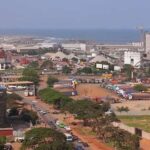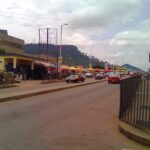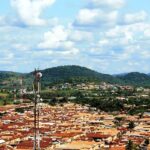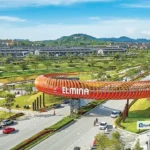Tamale
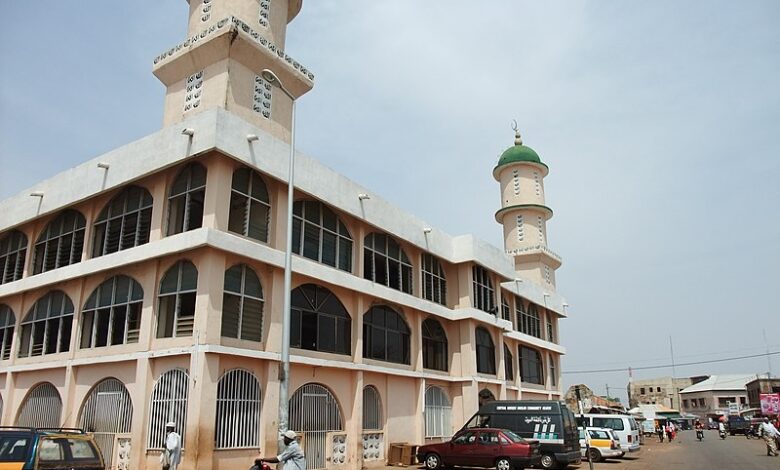
Tamale is a town situated in north-central Ghana, perched at an elevation of 600 feet (183 meters) above sea level on a plain located 22 miles (35 km) to the east of the White Volta River.
Characterized by its modern infrastructure and broad streets, Tamale plays a pivotal role as the administrative, financial, commercial, and transportation hub for the northern region of Ghana. Surrounded by densely populated villages, the town also serves as an educational centre, hosting various teacher-training colleges, secondary schools, and facilities for artisan training. The Vernacular Literature Bureau in Tamale contributes to mass literacy campaigns by providing newspapers and literature.
Tamale serves as a focal point for agricultural trade, boasting cotton-milling and shea-nut enterprises. The town is strategically positioned along the main road northward from Kumasi, with additional roads connecting it from the east and west. Tamale is accessible by air, thanks to its airport.
Since the mid-1970s, government assistance has prioritized initiatives such as road reconstruction, market expansion, industrial development, and sanitation improvements in Tamale. As of the year 2000, the population stood at 202,317, which increased to 371,351 by 2010.
Map view
More about Tamale
| ID |
|---|
| 52208 |
| Name |
| Tamale |
| State ID |
| 51 |
| State Code |
| NP |
| State Name |
| Northern |
| Country ID |
| 83 |
| Country Code |
| GH |
| Country Name |
| Ghana |
| Latitude |
| 9.40079000 |
| Longitude |
| -0.83930000 |
| WikiData ID |
| Q7674984 |
Tamale (Dagbani: [ˈtamali]) is the capital city of the Northern Region of Ghana. It is Ghana's third largest city, with a population of 758000. The city has been ranked as the fastest-growing city in West Africa. Tamale is located in the Kingdom of Dagbon, Ghana's oldest Kingdom.
Tamale boasts a thriving artistic and literary scene, evident in its numerous art studios, poets, and musicians. Numerous art studios are scattered throughout the urban landscape. Annual festivals are celebrated all around the city, such as fire festivals and also Eid ul-Fitr and Eid Adha.
The area of Tamale used to consist of small villages, which were under the kingdom of Dagbon. it was a popular destination of cattle trails in the region. In 1907, the British decided to establish administrative headquarters in the area with help from the Dakpema after German officials have taken over Yendi. With the addition of a road in 1920, nicknamed the 'Great North Road', Tamale turned into an important center of business in the Northern Territories.
Throughout the 20th century, the population of Tamale was growing rapidly of people looking for abundant water supply and electricity. This have resulted in massive amounts of land used for infrastructure, threatening residents ability to farm. During this time, a series of disputes between the Gulkpe Na and the Dakpema for power in Tamale occurred. This is in part due to the British incorporated indirect rule in the town, resulting in the imbalance of power between the chiefs. Although local councils were introduced and indirect rule was discontinued, tension between the chiefs continues even to this day.
Historically ruled by a rural agriculture system, Tamale's economy in recent times have diversified into many different sectors. Most of Tamale's population is employed in agriculture, although the common droughts in the region have threaten this sector. Other popular sectors including trading, teaching, and manufacturing. Even though the economy is considered diverse, Tamale suffers from a high unemployment rate and high rates of poverty. There is also a small amount of NGOs operating in the city.
The city is made up of many different ethnic groups with the majority being the Dagombas. Other groups who lived in the area include the Gonjas, Mamprusis, Akan, Dagaabas and other groups from the Upper East Region. 90.5% of the population are Muslims, followed by Christians, spiritualists and traditionalists.
Tamale has a mayor–council form of government. The mayor is appointed by the president of Ghana and approved by the town council, the Tamale Metropolitan Assembly. Although, suggestions have been made by residents to increase accountability of the office by having the mayor elected. The current mayor of Tamale is Hon. Sule Salifu.
Tamale is the educational hub of Northern Ghana. Education Ridge, a suburb in Tamale, is known for being the location of multiple schools crammed into a small area of 3 km2 (1.2 sq mi).
This is a list of senior high schools, colleges, and universities in Tamale:
Tamale is served by Tamale International Airport. Located about 11 km (6 nmi; 7 mi) from downtown Tamale, the airport is mainly used by commercial airlines such as Africa World Airlines and Passion Air which are the only operational companies as of 2024. They run regular flights between Tamale and Accra's Kotoka International Airport, along with other regional capitals.
There are public transports from Tamale to major cities such as Kumasi, Accra, Mim, Ahafo, Cape Coast, Sunyani, Takoradi, Tema, Ho, Wa, Bolgatanga, Elubo, Aflao, and Techiman. They are operated by Tamale's bus rapid transit system, tro-tro, MetroMass, STC Bus Lines, and other privately owned bus companies.
Taxis in the past used to be one of the most popular means of getting around Tamale for visitors to the town until the arrival of the tricycles, popularly called 'Mahama-Cambuu' or 'yellow-yellow'. It rise to popularity due to being cheaper than the taxi despite being more dangerous. The popular means of travel for locals however is by motorbike.
Tamale has a tropical wet and dry climate. The metropolis experiences it's rainy season from April to September or October. The mean annual rainfall is about 1,100 mm (43 in) within 95 days of rainfall in the form of tropical showers. Consequently, staple crop farming is highly restricted by the short rainy season.
The city is home to the Tamale Teaching Hospital, which helps to handle health related issues for the whole region. It is the 3rd largest hospital in the country. It also offers undergraduate and graduate programs in medicine, nursing, and nutrition.
Tamale is home to Real Tamale United along with other smaller clubs. They played at the Aliu Mahama Sports Stadium (formerly Tamale Sports Stadium), which was the location of some of the matches played during the 2008 African Cup of Nations. Due to the state of the stadium, FIFA and CAF have prevented international matches to be played in the facility.
Tamale is twined with:
- Mubarak Wakaso, professional footballer
- Haruna Iddrisu, Member of Parliament for Tamale South and the former Minister for Employment and Labour Relations in Ghana, Minority leader of Parliament
- Abdul Majeed Waris, professional footballer
- Fancy Gadam, Afro-pop and dancehall artist
- Alhassan Yahaya Seini, barrister and director of the Legal Aid Commission
- Mahamudu Bawumia, politician
- Sheikh Bayan Basha, Islamic preacher
- Alhassan Suhiyini, politician
- Inusah Fuseini, politician
- Alhassan Bashir Fuseini, politician
- Mona 4Reall, Socialite, model, musician, and businesswoman
- Maccasio, Hip hop, hip life artist and an entrepreneur
- Ibrahim Mahama, artist
- Yendi
- Savelugu
- Tamale Central Market
- Official website of the Tamale Metropolitan Assembly
- Official Tamale Senior High Page
- Official UDS website
References
- http://ghanadistricts.com/districts/?r=6&_=80&rlv=location
- http://www.catointl.org/download/TamaleChildrensHome.pdf
- http://www.ghana-pedia.org/org/index.php?option=com_directory&listing=Tamale%20Airport&page=viewListing&lid=140&Itemid=36
- http://www.sister-cities.org/directory/IntllistingsResults.cfm
- http://www.ghanaweb.com/GhanaHomePage/NewsArchive/artikel.php?ID=49121
- http://ndn.nigeriadailynews.com/templates/?a=2762
- http://www.tamalemetro.gov.gh/
- http://www.ghanaweb.com/GhanaHomePage/NewsArchive/artikel.php?ID=270959
- http://population.mongabay.com/population/ghana
- http://www.tamasco.edu.gh/
